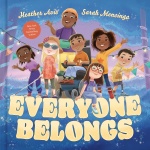Reducing Racial Bias
June 10, 2024
Quote of the Week
"Diversity doesn't look like anyone. It looks like everyone." - Karen Draper
Five Ways To Reduce Racial Bias In Your Children
 "How do we combat racial prejudice? New research reveals how parents influence the formation of bias in children.
"How do we combat racial prejudice? New research reveals how parents influence the formation of bias in children.
Children notice differences across racial lines. Even from a very young age, babies scan a face differently if it belongs to someone of a different race, suggesting that racial bias may be hardwired.
However noticing differences is not the same as having negative or positive beliefs around differences. Those types of judgments develop over time and are influenced by many things, including the social climate children grow up in and the experiences they have that confirm or disprove their biases.
This is where parenting comes in. Though it’s clear that parents are not solely responsible for biasing their kids one way or the other, science suggests that they do play a role—and an important one. In fact, their influence may extend well beyond a child’s early years and into adolescence." [read more]
Reading Corner
 Title: Everyone Belongs
Title: Everyone Belongs
By: Heather Avis
Ages: 3-7 years
A joyful rhyming book that encourages children to not only value all people but to also make room for their differences in order to make a better, brighter, and more beautiful world.
“We know everyone's different; no two are the same. You belong in our show!” the sisters exclaimed.
Macy and Tru are putting on a spectacular talent show to highlight the ways they love to perform. Other kids arrive, eager to participate but unsure if they’ll be welcomed. Since the two sisters know that everything is a lot more fun when everybody’s included, they’re determined to find a role in the show for each person.
Inspiring, encouraging, and packed with joy, Everyone Belongs reminds us that it’s possible to make room for all people and all abilities—and that life is brighter when we give every person a chance to shine.
Be the Change
There's no "right" way to talk to your kids about diversity. For each family, that conversation will be different, depending on your own race, nationality, and personal experiences. Parents can do many things to raise compassionate kids who want to help others. Help your child process thoughts and feelings by asking questions like, "What do you think about what you saw on TV?", "What have you heard?" or "What are your friends talking about?" This helps you get a sense of your child's understanding so you can fill in any gaps with facts or emphasize the values that you hold in your family.
It's OK not to have all the answers. If you don't know how to answer something, be honest and say so. Tell your child that you'll find out and share what you've learned. Talk often as a family and do things together to learn about and celebrate the differences between people. You'll help nurture your child's empathy for other people, and your own.





